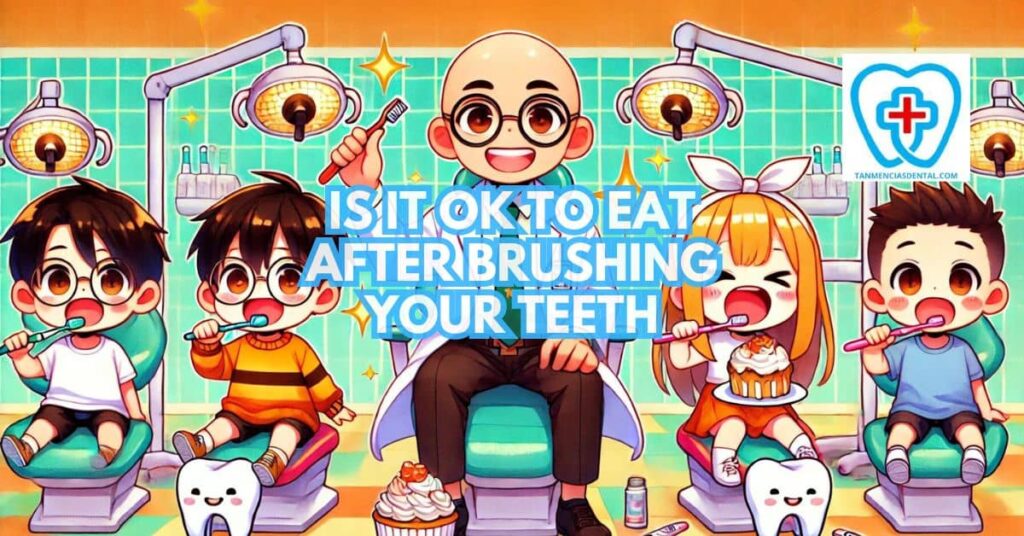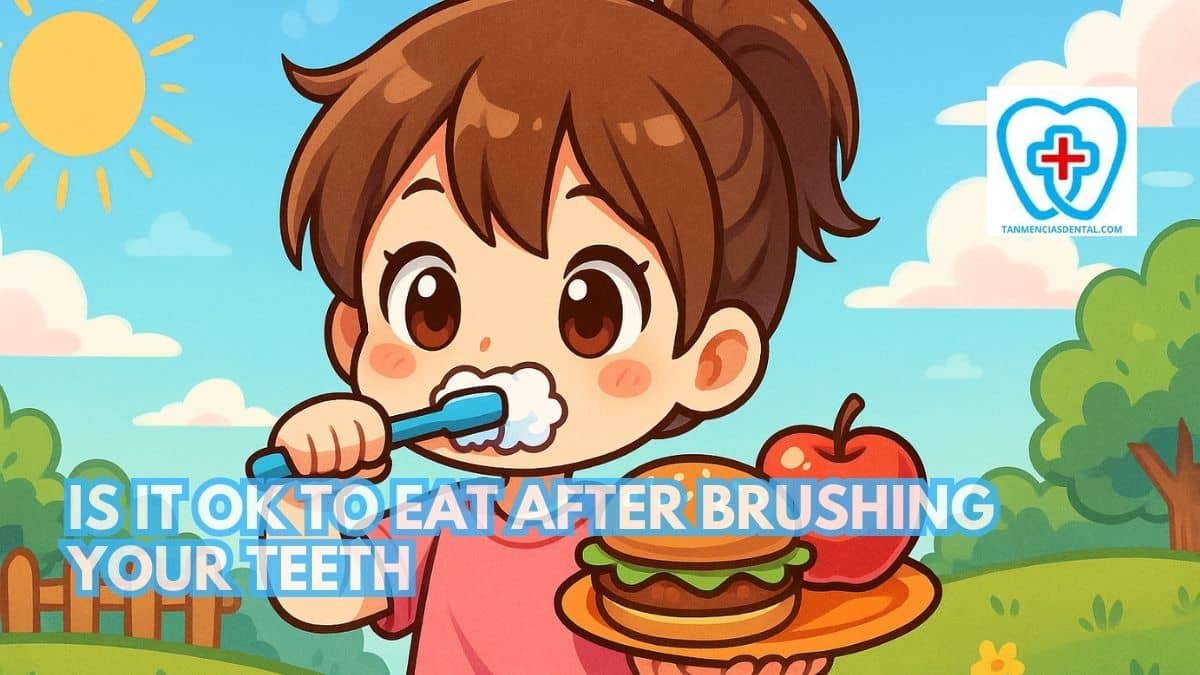Many people wonder, is it ok to eat after brushing your teeth?
The answer depends on how toothpaste, saliva, acids, and fluoride interact in your mouth.
Eating too soon can reduce the protection that brushing gives your teeth and may make enamel weaker.
Knowing which foods or situations can cause problems will help you choose the right time to eat after brushing.
We’ll explain when it is safer to eat, why waiting matters, and how to keep a healthy balance between brushing and eating.
1. Brush Before Bed: Why Nighttime Brushing Reigns Supreme
Nighttime brushing is important because it clears away plaque and food pieces that collect on teeth during the day.
If people forget to brush their teeth before sleeping, bacteria in their mouth use those food pieces to grow quickly.
As these bacteria break down sugars, they release acids that can start the process of tooth decay.
Brushing carefully with a toothbrush at night lowers the number of harmful germs and protects the gums from swelling or bleeding.
It also reduces the chance of bad breath in the morning because fewer bacteria remain active overnight.
When nighttime brushing is skipped, plaque hardens into tartar, which is much harder to clean and increases the risk of gum disease.
Dentists advise that everyone brush their teeth for two minutes, making sure to clean the front, back, and chewing surfaces of every tooth.
This routine is especially important at night because saliva flow slows down during sleep, giving bacteria in your mouth more time to cause damage.
Making brushing before bed a daily habit greatly improves long-term oral health and helps keep your teeth strong and free from decay.
🦷 Can Pediatric Orthodontists Prevent Complex Dental Problems? Early Interventions Explained
2. Morning Munchies: Brushing First, But Consider the Food’s Acidity
In the morning, it’s best to brush before breakfast to eliminate overnight bacteria.
However, eating acidic foods right after brushing can weaken your enamel since toothpaste temporarily softens it.
Foods like oranges, tomatoes, and coffee are acidic and can damage your teeth if consumed immediately after brushing.
To protect your enamel, wait at least 30 minutes after brushing before eating these types of foods.
This gives your saliva time to neutralize acids and strengthen your enamel again.
🦷 Why are My Gums Peeling After Brushing My Teeth?
3. Acidic Situations That Change When You Can Eat After Brushing
Acid from reflux, vomiting, sports drinks, or sour candy can weaken the surface of your teeth.
Brushing or eating right after this makes it easier for enamel to wear away.
It is better to rinse your mouth with plain water or a mild baking soda solution instead of brushing right away.
Waiting about thirty minutes gives your teeth time to harden again before you eat or brush.
This simple step helps protect your teeth from lasting damage after strong acid exposure.
🦷 How a Children’s Dentist Makes Dental Visits Fun and Stress-Free
4. The Power of Fluoride: Why Waiting After Brushing Strengthens Your Teeth
Fluoride in toothpaste helps strengthen tooth enamel by making it more resistant to decay.
Waiting to eat after brushing allows fluoride to fully absorb into your teeth, providing maximum protection.
If you eat right away, you may wash away the fluoride before it has a chance to work effectively.
This is why it’s recommended to wait at least 30 minutes after brushing before eating or drinking anything besides water.
Allowing fluoride to do its job can lead to stronger, healthier teeth.
🦷 Fresh Breath, No Paste? How to Brush Your Teeth Without Toothpaste and Keep Smiling

5. Saliva: Nature’s Defense and Why It Can Wash Away Fluoride
Saliva plays a crucial role in maintaining oral health by neutralizing acids and washing away food particles.
After brushing, your mouth produces saliva, which helps clean your teeth naturally.
However, this can also wash away the fluoride from your toothpaste if you eat or drink too soon.
Giving your mouth time to absorb fluoride before saliva washes it away enhances its protective benefits.
Understanding this balance can help you optimize your brushing routine for better dental health.
🦷 Beyond the Bristles: Creative Ways on How to Clean Teeth Without Brushing
6. Exceptions to the Rule: When a Post-Brushing Sip is Okay
In some cases, it’s okay to drink water after brushing, especially if your mouth feels dry.
Water is neutral and doesn’t harm your teeth, unlike sugary or acidic drinks.
Sipping water can also help rinse away any remaining toothpaste, keeping your mouth fresh.
However, it’s still best to wait before consuming other beverages to allow fluoride to protect your enamel.
Being mindful of what you drink after brushing can make a significant difference in your oral health.
🦷 Brushing Up on Basics: Can You Spread Gingivitis to Others?
7. Finding Balance: Healthy Snacking After Brushing
If you need to eat after brushing, opt for healthy snacks like fruits or vegetables.
These foods are less likely to harm your enamel compared to sugary or acidic snacks.
For example, apples and carrots can actually help clean your teeth by increasing saliva production.
Incorporating healthy snacks into your routine supports your overall dental hygiene.
Balancing your diet with tooth-friendly foods can make post-brushing eating less of a concern.
🦷 Brushing Your Teeth Too Hard? You Might Be Doing More Harm Than Good!
8. Consult Your Dentist: A Personalized Brushing and Eating Routine
Everyone’s dental needs are different, and consulting your dentist can help you create a personalized brushing and eating routine.
Your dentist can provide specific recommendations based on your oral health status, dietary habits, and lifestyle.
They can advise on the best times to brush and eat to maximize the benefits of fluoride and reduce the risk of enamel erosion.
Regular dental checkups ensure that your routine is effective and adjusted to any changes in your oral health.
Personalized advice from your dentist can lead to better long-term dental care.
🦷 When Can You Eat After Brushing Your Teeth?
9. Don’t Skip Brushing for Later Snacks: Brushing After Meals is Key
It’s tempting to skip brushing if you plan to snack later, but maintaining regular brushing habits is crucial.
Brushing after meals helps remove food particles and bacteria that can cause plaque buildup.
Consistent brushing after eating, especially sugary or starchy foods, reduces the risk of cavities and gum disease.
By brushing regularly, you ensure that your mouth stays clean and healthy, even if you snack throughout the day.
Don’t let the convenience of skipping brushing compromise your oral hygiene.
🦷 How to Find the Best Dental Implants in Marikina Clinics and Specialists
10. How Long Should You Wait to Eat After Brushing Your Teeth?
Waiting at least 30 minutes after brushing before eating is generally recommended.
This allows the fluoride from your toothpaste to strengthen your enamel and reduces the risk of damaging your teeth.
Eating too soon can wash away the fluoride, diminishing its protective effects.
Additionally, waiting gives your saliva time to neutralize acids and restore the pH balance in your mouth.
Following this waiting period can lead to better overall dental health.
🦷 Basic Dental Needs in Marikina
11. Brushing First or Eating First: What Happens When You Eat Before You Brush?
Eating before brushing can leave food particles and acids on your teeth, which can be harmful.
These remnants can weaken your enamel and contribute to plaque buildup.
Brushing afterward helps remove these particles and protect your teeth from decay.
It’s especially important to brush after consuming sugary or acidic foods to prevent enamel erosion.
Always brush your teeth after eating to maintain optimal oral health.
🦷 Teeth Care Services in Marikina
👨⚕️ Conclusion
It’s generally best to wait before eating after brushing your teeth.
This practice helps ensure that the fluoride in your toothpaste can strengthen your enamel and protect your teeth.
Waiting at least 30 minutes after brushing before eating or drinking anything besides water is recommended.
For the best dental advice, always consult your dentist and follow their recommendations for brushing and eating routines.
Taking these steps can help you maintain a healthy and effective oral hygiene routine.
😊 Self-Promotion
Visit Tan-Mencias Dental Clinic in Parang, Marikina City, for all your dental needs!
Our friendly team is dedicated to providing top-notch care in a welcoming environment.
Have questions or need to schedule an appointment?
Call us at 9171451074, leave a message on our Facebook page, or fill out the contact form on our website.
We’re here to help you achieve a bright and healthy smile!

